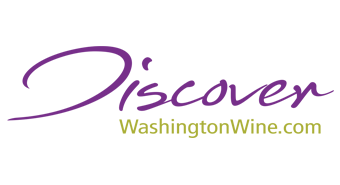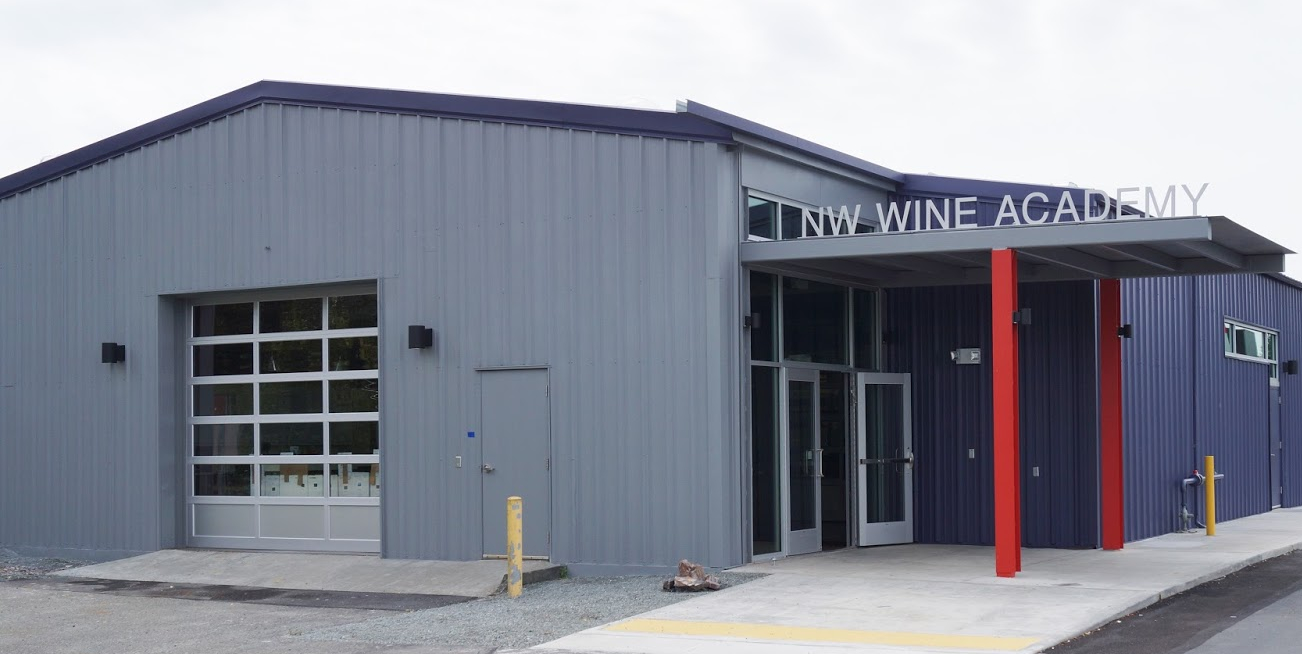Northwest Wine Academy: Since 2004, It Has Been Preparing
Students to Work in All Aspects of the Washington Wine Industry
The academy has grown into a full series of programs, from wine sales and marketing to production and classes in winery tourism…and even compliance and cellarmaster work.
By Mark Storer

Community members enjoy a pre-pandemic wine release party in the NWWA tasting room in 2019. Because of the pandemic, the tasting room is still closed to the public but may open for in-person tasting again this spring.
The dream of a wine country lifestyle has long lured even the most casual consumer of wine. Dreams of the “gentleman” or “gentlewoman” farmer, slowly strolling through lush vineyards with a glass of wine in hand as the sun sets above the evening mist have nearly become cliches.
Perhaps the pandemic’s great shift, or just the economic outlook, have pushed people out of otherwise mundane careers, and recent years have seen many start looking for a transition into a world they fell in love with, and want to know more about.
Seattle’s answer to the ever-increasing interest in the world of wine is the Northwest Wine Academy at South Seattle College, located in West Seattle. Established in 2004, the academy has grown into a full series of programs, from wine sales and marketing, to production and classes in winery tourism and even compliance and cellarmaster work. The academy also operates a commercial winery, tasting room and, through a partnership with Chateau Ste. Michelle, access to vineyards in Woodinville.
“Different groups of people attend the academy for different reasons,” said Brian Scheehser, Dean of the academy and other programs at South Seattle College. “There are industry professionals who are looking to increase their knowledge, or maybe just their wage and they will take food and wine classes. That segment is not necessarily looking for a degree or certificate.
“We have young students who are just coming out of high school (Scheehser says there aren’t many of those at the academy), we have veterans and people changing careers altogether,” Scheehser continued, adding that many students enter the academy not just to learn to run their own winery, but to train for jobs at existing wineries, some of which pay well — like cellarmasters or marketing professionals.
To be certain, what one won’t find at the academy are dreamy and starry-eyed romantics who are suddenly disillusioned by the enormous amount and the sheer variety of work it takes to produce good wine. The students who come to the Northwest Wine Academy are ready to learn the craft from soil and stem to bottle and glass.
Scheehser, a former chef with 40 years of experience, believes that the academy is just what Washington needs. “We’re listening to industry professionals tell us what they need and that’s what we’re training for,” he said. “Maybe there is an opportunity down the road to introduce a distilling program, or some other branch and explore those opportunities. We’re constantly thinking about how we can evolve and grow. We have a lot of really good strong connections.”
Those connections include international partners like the French Wine Society, L’Ecole du Vin de Bordeaux and the International School for Culinary Arts. They also partner with Allan Brothers Fruit Company, located in Naches, WA., and they donate fruit to the students to make wine with.

Northwest Wine Academy winemaker and wine production instructor Bill Snyder (right) discusses a work order with student Mike Freund.
The academy had nearly 198 students enrolled in the 2017-18 school year. Those numbers have gone down, largely due to the pandemic response and the need for online classes, as well as capping class sizes to allow for some distancing. The most recent figures showed an enrollment of 122 students during the 2020-21 school year and that represents a limit placed by the college, rather than shrinking interest. In fact, interest in the program continues to grow according to Ty Swenson, Director of Communications for South Seattle College.
With a long background working in wineries, Bill Snyder teaches a number of classes, including Wine 101, Viticulture and Oenology, the production classes of which there are two cohorts, Advanced Wines of the World and New World Wines. “We are the only wine production program west of the Cascades in the state,” Snyder said. “We do a pretty gradual entry into the cellar and give students sort of the basics. It sounds like a joke, but the fact is wineries can be dangerous places and a lot of the introduction to the program is sort of ‘how not to die in a winery.’”
Snyder is the only full-time instructor at the academy. “Our part-time faculty is wonderful, they all come from the industry and so bring this real-world experience and real stories to their students,” he said. “One of the things that attracted me to this industry is there isn’t just one way to do it.”
The academy’s practical approach to the wine industry covers a number of bases, though it would be naive to think one can simply go to school and learn how to make great wine. “The best wine in the world is not made by wine Ph.D. ‘s,” said Snyder. “There is so much to learn and so many ways to do all of it, there’s no way to cover what winemaking is just in a classroom.”
The classroom, however, is a good starting place. The academy has a long list of alumni who have made it big in the Washington wine industry. They include Bill Grassie of William Grassie Wine Estates, John Patterson of Patterson Cellars, Jason Morin of Ancestry Cellars, Tom Strangeland of Cloudlift Cellars, Chris Loeliger of Truth Teller Winery, Terry Wells of Love That Red Winery, Seth Kitzke of Kitzke Cellars, Scott Greenberg of CZ Cellars, Jeff and Sheila Jinka of Davenport Cellars, Kit Singh of Lauren Ashton Cellars, Matt Austin of Grosgrain Vineyards, Todd Threlkeld of T2 Cellars, Nicole Camp of Lashelle Wines, Michael Savage of Savage Grace Wines and Charlie Lybecker of Cairdeas Winery.
Savage, a 2009-11 academy alum who owns and operates Savage Grace winery in the Columbia Gorge, including some vineyard land, said the program was a turning point for him. “I came into the program knowing what wine style I wanted to do,” Savage said. “I was very much old-world wine, more European style inspired and I took a couple of classes that really helped me zero in on what I wanted.” Savage Grace produces a number of single varietals with lower alcohol levels, including Cabernet Franc, Malbec and the Austrian varietal, Gruner Veltliner.
Savage, who still hires interns from the academy, started the production program and began learning the basics about working in a winery. “I was more interested in a minimal approach with natural fermentation and more natural winemaking. The school wasn’t as focused on that, but I was able to learn and get a good handle on modern winemaking and that was really wonderful for me.”
Savage said learning wine chemistry was “hugely influential” for him because though he has adopted a much more “old world” technique, understanding wine chemistry helped him make better choices and directed him where he wanted to go. “I’m exactly where I want to be, making wine in the (Columbia) Gorge.”

Former Northwest Wine Academy Winemaker and Wine Production Instructor Tracey LaPierre (left) works with students Steven Kovacs (of Kovvin/Kovacs Vineyard), and Marty Sherman and Nicole Camp (of Lashelle Wines), performing a pump over on a batch of fermenting grapes during the academy’s 2019 crush.
Charlie Lybecker is an alum and classmate of Savage’s and owns, along with his wife Lacey, Cairdeas Winery in Manson, WA., in the Lake Chelan Valley.. “The program really offers a solid foundation in the fundamentals. It’s a solid set of basics.,” said Lybecker. Cairdeas makes Rhone-style wines, which include Syrah, Grenache, Mourvedre, Rousanne, Viognier and has the only vineyard in Washington growing Picardan. He produced 7,500 cases of wine in 2021.
Lybecker was making wine at home in Seattle before he entered the program and got licensed in 2009, the same year he entered the academy. He said the academy really gave him the tools to be more precise and cemented his belief in Washington wine. “Washington is a great place to grow Rhone-style wines and I think we have some of the best growing areas for varietals like Syrah,” he explained.
“Playing around with different vineyard sources and making wine in different ways allowed me to learn what I wanted to focus on. My class at South Seattle was filled with rock stars including Michael Savage. I agree with him that the school teaches the fundamentals of winemaking and that’s just a great place to start to learn how to make good, clean and serious wine.”
Like all sectors of the economy, the pandemic has caused problems for the program, chiefly the shutdown of the academy’s tasting room. ”The sales are direct-to-consumer and the pandemic has really pinched that with the tasting room being closed,” said Snyder. “But we’re going to be able to sell Northwest Academy wines online very soon.” Snyder indicated that by this spring the academy’s website will feature a link to purchase wines online – and the tasting room may open for in-person tasting around the same time.
When the Academy’s tasting room gets back to normal operations, it will again begin offering wine for sale, both online and eventually, in person. Its wines are as diverse and unique as the students themselves and include Muller Thurgau, a white wine with stone fruit flavors, low alcohol and an off-dry profile. At one time, the most widely grown grape in Washington was Riesling and, of course, the tasting room offers one from Willard Vineyard in the Yakima Valley. It has an off-dry profile with floral honeysuckle and mineral flavors.
There’s also a white blend known as Convocation White, which features white Rhone varietals Rousanne and Viognier blended with Washington Riesling, resulting in what the tasting room profile refers to as “creamy richness with medium acidity.” Rounding out the white wine offerings is Pinot Gris and a blend of Riesling and Muscat Ottonel called Duet White.
The red wine profile is just as adventurous, leading off with an Austrian grape that grows well in the Yakima Valley called Blaufrankisch. This is a lighter-bodied wine with ripe and generous notes of plum, tobacco, black currant and a slightly peppery finish. The tasting room also makes a rose of Blaufrankisch as well as a rose of Syrah.
Lastly, the tasting room’s Convocation Red is a blend of Merlot, Blaufrankisch and 10 percent “field blend,” that features berry aromas with hints of cloves and tobacco.
Snyder said the program continues to grow, along with the Washington wine industry, now home to more than 1,000 wineries and 60,000 acres of vineyards. “I try to stay impartial when it comes to styles of wine,” said Snyder. “I want students to be able to ask the right questions. If the only thing you leave with is a sense of what questions to ask in your next winemaking experience, I’ve done my job.”
From that starry-eyed dreamer to the practical winegrower and winemaker who learns about nature’s processes, as well as the laboratory, the barrel and the bottle, the Northwest Wine Academy provides fertile soil for the growth of the next generation of winemakers in the Pacific Northwest.
To learn more about the programs that the Academy offers, visit: www.nwwineacademy.southseattle.edu or email: wineinfo@seattlecolleges.edu. The Academy is located at South Seattle College, 6000 16th Ave SW., Seattle, WA 98106.


